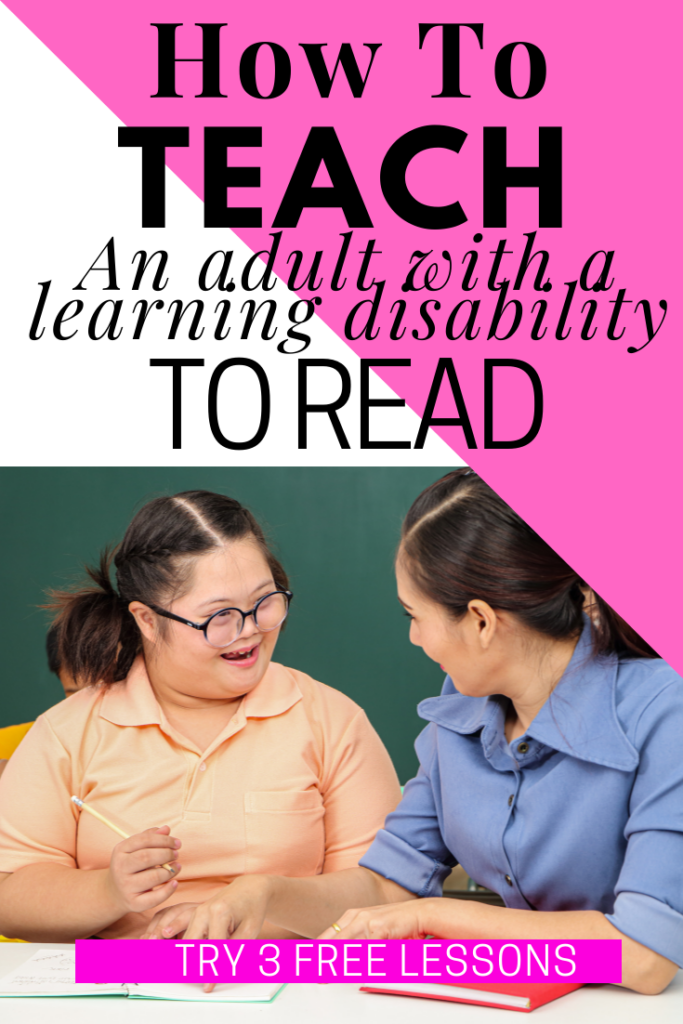Teaching Reading to Adults with Learning Disabilities
More than 65 million adults living in the United States have learning disabilities, and many of them struggle with reading. Unfortunately, reading doesn’t come naturally to everyone, and many suffer in silence because they’re embarrassed and don’t want others to know that they can’t read.
If you have an adult in your life with a learning disability who would love to know how to read, there are several ways to assist them. The key is to take the right approach while providing the encouragement and motivation needed to keep this person from feeling discouraged on their journey.

How to Teach an Adult with Learning Disabilities to Read
Teaching an adult with learning disabilities to read is similar to teaching someone young to read, but you need to consider the age of the person you’re helping. It helps to buy engaging, age-appropriate books that won’t make these adults feel like you’re trying to dumb things down for them. If you want the disabled adult in your life to feel encouraged, be sure to follow the next several steps.
Step 1: Make sure they know and understand ALL of their ABCs.
Step 2: Ensure that the adult knows the sounds of EACH letter of the alphabet.
Step 3: Start by teaching sight words to the adult. Over time, they will slowly learn new words based on the fact that they are seeing them more and more!
Step 4: Next, teach CVC words (consonant vowel consonant words) to help them sound out each word.
Step 5: Read small books together. Challenge the reader by adding harder books as you go!
Have Patience
Before you get started, understand that this is a process that can take some time. You need to have patience and be consistent. Don’t belittle the adult in your life for not knowing how to read. In fact, you can lead by example while reading stories to them to get started.
You can have them look at the words you’re reading, while you’re saying them so that they can get a feel for how these words look and what types of letters get put together to make them. Reading together is a fantastic way to provide the encouragement that an adult with learning disabilities might need.
Read a Little More Each Day
Set a goal to have this person reading a little more each day. It all starts with a short page, but it turns into finishing a book with hundreds of pages. Be sure to set small, realistic goals in the beginning and wait until your loved one makes progress until you start pushing for more significant goals. A little reading each day can go a long way.
Help them Fall in Love with Reading
Make sure you’re doing your research and finding the right books that can make a difference. For example, many adults who’ve struggled with dyslexia throughout their lives have named some of the books that helped them fall in love with reading books, such as The Da Vinci Code by Dan Brown and The Right Stuff by Tom Wolfe.
If you have any books that you personally love and feel would be a good fit, consider getting them for the adult to see if they’re interested. When someone likes the idea behind a specific story, it often encourages them to want to read more, which can help with the process of teaching the adult in your life how to read better than before.
Try the Reading Patch TEACHER’S MANUAL FOR HOW TO TEACH AN ADULT TO READ
If you want to try teaching an adult to read, consider using the Reading Patch Teacher’s Manual for How to Teach an Adult to Read. While the Reading Patch site was built to help children learn to read using on-demand video reading lessons, they have had a lot of success with adults too! The How to Teach an Adult to Read teacher’s manual has 120 explicitly scripted lessons and many materials to help you teach reading. You can download and try 3 Free Reading Lessons here. Soon you will be on your way to helping teach an adult to read.
-
 Product on saleTeach an Adult to Read – Complete PDF BundleOriginal price was: $49.99.$29.99Current price is: $29.99.
Product on saleTeach an Adult to Read – Complete PDF BundleOriginal price was: $49.99.$29.99Current price is: $29.99.
Tools for Helping Adults with Learning Disabilities Learn to Read:
- Beginning or Struggling Reader Workshop: Lesson 2
- How to Teach an Adult to Read
- Teach and Adult to Read – Complete Bundle
With millions of adults living in the United States who have learning disabilities, many don’t know how to read and haven’t received the support or assistance needed to get on track. If you’re trying to help a loved one learn how to read, choose the right books, have patience, and make it a priority to stay consistent.

